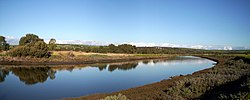Onkaparinga River: Difference between revisions
pictures |
minor rewrite |
||
| Line 14: | Line 14: | ||
The '''Onkaparinga River''' runs from its source near Mount Torrens in the [[Mount Lofty Ranges]], and flows south westerly to an estuary at Port Noarlunga. The catchment is over 500 km² in area, and is in part located in the [[Onkaparinga River National Park]]. |
The '''Onkaparinga River''' runs from its source near Mount Torrens in the [[Mount Lofty Ranges]], and flows south westerly to an estuary at Port Noarlunga. The catchment is over 500 km² in area, and is in part located in the [[Onkaparinga River National Park]]. |
||
The Onkaparinga River is the second major river of the [[Adelaide]] region, after the [[River Torrens]]. It is a source of fresh water for the city, |
The Onkaparinga River is the second major river of the [[Adelaide]] region, after the [[River Torrens]]. The name derives from the indigenous [[Kaurna]] name Ngangiparri which translates as "The Women's River". |
||
It is a source of fresh water for the city, [[Mount Bold Reservoir]] was constructed between 1932 and 1938 along a section of its path approximately 20km inland. Much of its flow diverted to the [[Happy Valley Reservoir]] that in turn supplies some 40 per cent of Adelaide's water supply. Most years the flow to the reservoir is supplemented by water pumped from the [[Murray River|River Murray]] via a pipeline from [[Mannum, South Australia|Mannum]]. |
|||
Downstream from Mount Bold Reservoir is the [[Clarendon Weir]]. To maintain levels at Clarendon Weir, water is released only as required .The [[Onkaparinga Gorge]] extends from Clarendon to [[Old Noarlunga, South Australia|Old Noarlunga]]. An [[estuary]] extends from Old Noarlunga to the river's mouth at [[Port Noarlunga, South Australia|Port Noarlunga]]. The estuary is a significant breeding area for local marine fish species. |
|||
The river has an estuary which extends from its mouth at [[Port Noarlunga, South Australia|Port Noarlunga]] upstream to [[Old Noarlunga, South Australia|Old Noarlunga]]. The estuary is a significant breeding area for local marine fish species. Further upstream is the [[Onkaparinga Gorge]] that extends from Old Noarlunga to [[Clarendon, South Australia|Clarendon]]. |
|||
The name derives from the indigenous [[Kaurna]] name Ngangiparri which translates as "The Women's River". |
|||
[[Image:Onkaparinga Estuary 1.jpg|thumb|750px|left|Onkaparinga Estuary in Winter during late afternoon looking East towards [[Onkaparinga River National Park]].]] |
[[Image:Onkaparinga Estuary 1.jpg|thumb|750px|left|Onkaparinga Estuary in Winter during late afternoon looking East towards [[Onkaparinga River National Park]].]] |
||
==External links== |
==External links== |
||
Revision as of 18:05, 25 August 2007
| Onkaparinga River | |
|---|---|
 | |
| Physical characteristics | |
| Mouth | Port Noarlunga |
| Length | 95 km |
The Onkaparinga River runs from its source near Mount Torrens in the Mount Lofty Ranges, and flows south westerly to an estuary at Port Noarlunga. The catchment is over 500 km² in area, and is in part located in the Onkaparinga River National Park.
The Onkaparinga River is the second major river of the Adelaide region, after the River Torrens. The name derives from the indigenous Kaurna name Ngangiparri which translates as "The Women's River".
It is a source of fresh water for the city, Mount Bold Reservoir was constructed between 1932 and 1938 along a section of its path approximately 20km inland. Much of its flow diverted to the Happy Valley Reservoir that in turn supplies some 40 per cent of Adelaide's water supply. Most years the flow to the reservoir is supplemented by water pumped from the River Murray via a pipeline from Mannum.
Downstream from Mount Bold Reservoir is the Clarendon Weir. To maintain levels at Clarendon Weir, water is released only as required .The Onkaparinga Gorge extends from Clarendon to Old Noarlunga. An estuary extends from Old Noarlunga to the river's mouth at Port Noarlunga. The estuary is a significant breeding area for local marine fish species.

